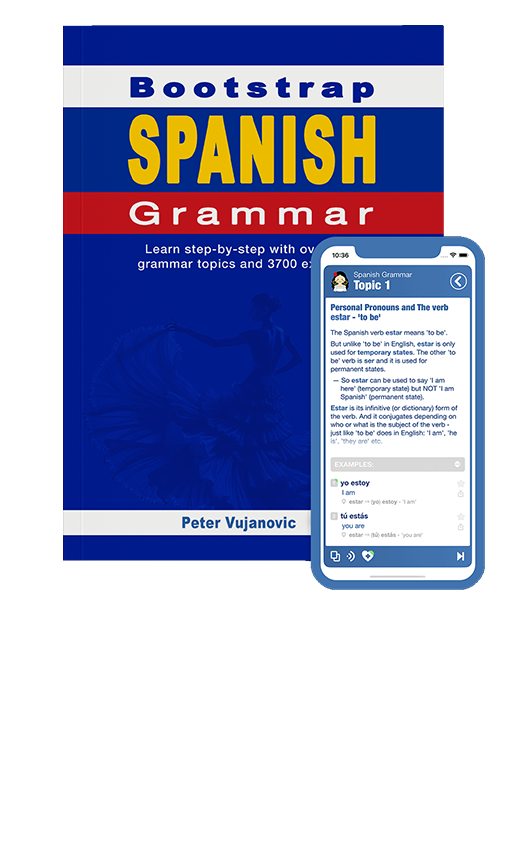Spanish grammar - The future perfect - el futuro perfecto |
|||
|
|||
The future perfect tense, known as el futuro perfecto, is used to describe actions that will have been completed at some point in the future. It is equivalent to the English 'will have' + [past participle]. In Spanish the future perfect tense is formed using the future tense of the auxiliary verb haber ('to have') followed by the past participle of the main verb. Recall that haber conjugates as follows in the simple future: • yo : haber ⇒ habré • tú : haber ⇒ habrás • él, ella, usted : haber ⇒ habrá • nosotros : haber ⇒ habremos • vosotros : haber ⇒ habréis • ellos, ellas, ustedes : haber ⇒ habrán And we previously saw how the past participle is formed. |
| Examples: | |
|
De aquí a la próxima semana, habré terminado mi proyecto.
By next week, (I) will have finished my project.
|
|
|
Para mañana, el profesor habrá corregido todos los exámenes.
By tomorrow, the teacher will have graded all the exams.
|
|
|
¿Habrás terminado el proyecto para el lunes?
Will (you, familiar) have finished the project by Monday?
|
|
|
María habrá comprado su coche nuevo para fin de año.
María will have bought her new car by the end of the year.
|
|
|
Nosotros no habremos completado el trabajo antes de las cinco.
We will not have completed the work before five o'clock.
|
|
|
Para el próximo verano, mis padres habrán renovado la casa.
By next summer, my parents will have renovated the house.
|
|
|
¿Habrá terminado Juan sus deberes para cuando lleguemos?
Will Juan have finished his homework by the time we arrive?
|
|
|
Para mañana, tú y yo habremos estudiado para el examen.
By tomorrow, you and I will have studied for the exam.
|
|
|
Ellos no habrán llegado a tiempo para la reunión.
They will not have arrived on time for the meeting.
|
|
|
Para las diez, Marta y Luisa habrán terminado la cena.
By ten o'clock, Marta and Luisa will have finished dinner.
|
|
|
¿Habrás leído el libro para entonces?
(You, familiar) Will you have read the book by then?
|
|
|
Para el viernes, la empresa habrá lanzado el nuevo producto.
By Friday, the company will have launched the new product.
|
|
|
No habremos terminado de pintar la casa para el fin de semana.
We will not have finished painting the house by the weekend.
|
|
|
Para cuando regresen, Juan y Pedro habrán arreglado el coche.
By the time they return, Juan and Pedro will have fixed the car. |
|
|
¿Habrán llegado los invitados antes de las ocho?
Will the guests have arrived before eight o'clock?
|
|
|
Para el próximo mes, habré aprendido a tocar la guitarra.
By next month, (I) will have learned to play the guitar.
|
|
|
Mi hermana no habrá terminado su carrera para el año que viene.
My sister will not have finished her degree by next year.
|
|
|
¿Habrán visitado ustedes el museo antes del domingo?
Will you (formal, plural) have visited the museum before Sunday?
|
|
|
Para entonces, los niños habrán aprendido a nadar.
By then, the children will have learned to swim.
|
|
|
No habré terminado mi libro antes de que llegues.
(I) will not have finished my book before (you) arrive.
|
|
|
¿Habremos completado el proyecto para la fecha límite?
Will we have completed the project by the deadline?
|
|
|
Él no llamó. Habrá perdido mi número de teléfono.
He didn't call. He must have lost my phone number.
|
|
|
El señor Gómez no está aquí; se habrá olvidado.
Mr Gomez is not here; he must have forgotten. |
|
|
Isabella está feliz; se habrá enamorado.
Isabella is happy; she must have fallen in love. |
|
 |
|




